ICCA Midwest Semifinal at Michigan Theater
Mike Chin checking in here after my very first trip to the great state of Michigan, and my very first International Championship of Collegiate A Cappella (ICCA) Midwest Semifinal.
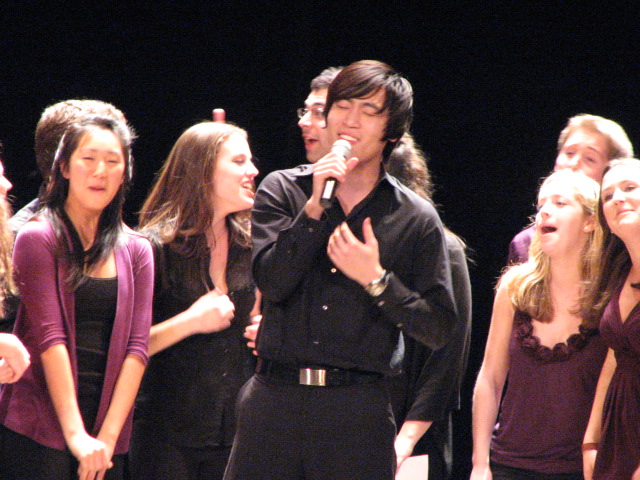
The University of Michigan GMen hosted the event, which occurred at The Michigan Theater, not far removed from The University of Michigan in Ann Arbor. It was a lovely, old-style venue, and Saturday night found most of its 1,700 seats filled with a lively crowd.
Before we get to the review, a quick summary:
The competitors:
The University of Michigan Dicks and Janes
University of Michigan Amazin' Blue
Illinois State University Secondary Dominance
The University of Michigan GMen
Missouri State University A Cub Bella
The Washington University Stereotypes
Northwestern University Purple Haze
The Northwestern University Undertones
Host Group:
The GMen
Emcee and Special Guest:
Alan Smola
Guest Group:
Michigan State University Capital Green
Photos from the event are available now on our Facebook page.
Capital Green opened the show with Ingrid Michaelson’s “Locked Up.” The mixed group took the stage without introduction, and, to my knowledge, there hadn’t been a prior announcement they would be there. It was a bit strange to see them arrive with so little fanfare, and stranger yet that this was the last we would see of them for the evening. The group looked sharp, all in black, with the guys wearing green ties. I found the performance a bit static, but appreciated the use of claps for percussion at the bridge, and found it to be a good opener, all considered.
Michigan sophomore Alan Smola had emcee duties for the night. Smola is a magician by trade and opened the evening with a trick that involved drawing a bird on paper, then prompting a bird to materialize from thin air. It’s magic, folks. All kidding aside, Smola proved himself a very good showman and very talented with his craft—particularly for someone at his young age. You can learn more about him here.
The Dicks and Janes, one of four “home groups,” opened the evening. The co-ed group had its guys in black slacks and vests, white collared shirts and purple ties. It was a good look, reminiscent of The SoCal Vocals in their 2008 run to the ICCA Championships, only sharper because it was better coordinated (I’m looking forward to seeing the Vocals again at this year’s finals, and hope they’ve improved their look this time around—it was really the only weak point for that year’s crew).
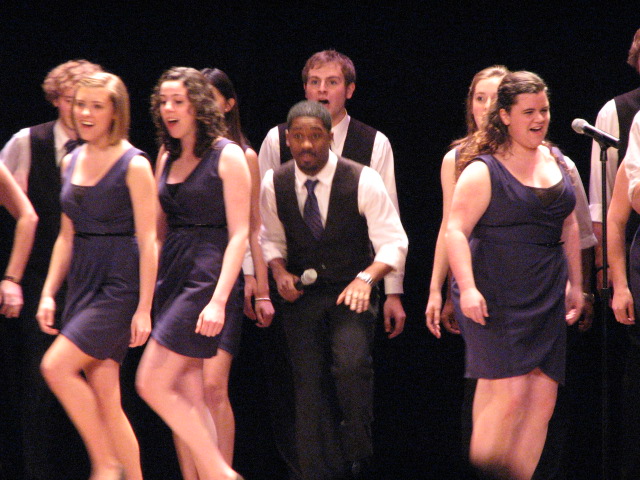
Enough with the fashion digression. The Dicks and Janes opened with a rendition of The Beatles’ “Eleanor Rigby.” The vocal percussion was very good, but aside from that, this one was just strange. This is a bit of a chaotic song to begin with, affording plenty of room for interpretation in the a cappella format, but this rendering of it just sounded messy to me. The lead vocal alternated between different vocal parts, but since no one was holding mics, and the group, on the whole, didn’t do much to vary its dynamics, it became increasingly difficult to pick out where the lead vocal even was. The staging more or less fit the song, with a lot of movement, and creative formations, which was good, but could have been much more effective had the sound been better. The song was a strange choice for an opener, and ultimately, didn’t wind up clicking for me at all.
The group turned back to basics for its second song, Fiona Apple’s “Paper Bag.” This jazzy number was good, but ultimately not very memorable. When a group opts use a song like this in its set, they often have the objective of showcasing a truly exceptional soloist. While the frontwoman for this song clearly had talent, this was not the sort of blow-away performance that’s going to steal the show. Without a lot going on musically or visually to back her up, the song didn’t offer much to get excited about.
The Dicks and Janes closed with Earth, Wind and Fire’s “September.” This was, far and away, the highlight of their set. The group stood in a cluster, then split down the middle to make way for the soloist for a moment in which the anticipation was positively palpable. This is the kind of soloist you can shine a spotlight on, tying your wagon to his harness, and letting him pull you to the promised land. Perhaps I’m overstating the case a little, but the solo was quite good here, and the whole group seemed to come to life a bit more, the background singers really punching their syllables, putting some pep into their movement. This wasn’t perfect—I found a goodly portion of the choreography pretty cheesy, and thought the women could have been used to greater effect in backing up that falsetto the soloist was fighting for on each chorus. Nonetheless, it was fine closer that went a long way toward redeeming the set for the first group.
The next group was Amazin' Blue. This mixed ensemble had its guys in tuxedos, while the women wore purple dresses—sort of a more formal version of the group to precede them. If nothing else, I can say that these Michigan groups did a good job of coordinating their colors. I don’t know how many times I’ve seen groups come out in mismatched blues or something of the sort—just enough of an effort to show they talked about their outfits before the show, but little enough to show that they didn’t go shopping together.
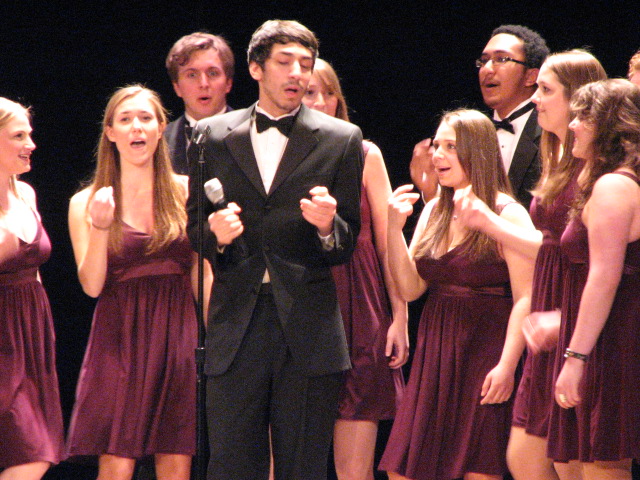
Again, I digress. Amazing Blue opened with U2’s “Where the Streets Have No Name.” There’s a reason Bono and co. chose to begin their Joshua Tree album with this song—it has a natural build, swells with feeling, and is a positively energizing tune. Excellent song choice. The solo was very good, but sounded a bit too formal, or classically trained for pop rock music—it was as though we were hearing U2 as reimagined by Jason Robert Brown. On an odd note, I found the arrangement oddly reminiscent of “Pinball Wizard” at points—maybe that’s just me. Nonetheless, the group hit its notes and showed very good stage presence for a fine opening song.
Next up was Don Henley’s “Heart of the Matter,” in the style of India.Arie’s cover. It was an interesting second song choice—not as slow as the traditional middle song ballad, but still emotionally provocative. I was on board. The solo was very good, but I was a bit disappointed to with the soloist and group in general’s decision to keep the sound clean, rather than powerful. Last fall, I heard The Johns Hopkins University Octopodes take on this same song, and while I would argue that Amazin' Blue sounded a bit better on the whole, they failed to capture the emotional core of the song that the Hopkins crew did. I probably would have cut the choreography from this one—while the sidesteps that occurred early on were good enough, the women in particular came to look a bit awkward, bending and bobbing as it went on, and this one probably should have had less movement at the fore in general, and done more to draw the audience’s collective eye to the soloist.
Amazin' Blue wrapped up with “December 1963 (Oh, What a Night)” by The Four Seasons. I found both this song choice and the execution pretty comparable to what The Dicks and Janes did with “September.” This was, rightfully, a showcase for the soloist, providing the opportunity for a charismatic frontman to work the stage and work his falsetto. The main addition to this one was the theatrics of the soloist tirelessly pursuing one of the women in the group. It was funny, but the routine grew a little tired by the end of the song, and I couldn’t help thinking the group should have done more to build that storyline, starting more casually then ending where they did to create more of a story and less of a running gag out of their visual presentation. With all of that being said, it was a worthy closing song to a solid set.
Secondary Dominance performed third. The all-female group kept it simple, dressed all in black for a look that I would have liked to have seen them do a bit more with, but that was, nonetheless, wholly inoffensive.
That is, it was inoffensive until the women put on their sunglasses. Here’s the thing—the world is an unfair place. All-female a cappella groups need to work hard to be taken seriously, and that point is all the more salient if the group members are young-looking. When you already have these strikes against you, you absolutely, positively, cannot open your set wearing sunglasses. I think the group was going for some combination of fearless, spunky and silly, but the end result was that they looked like a bunch of tweenagers playing dress up. This was a real disservice to the group because, as far as sound goes, they actually weren’t half bad on Lady Gaga’s “Poker Face.” It’s the right song choice—it’s the kind of contemporary number that a crowd actively wants to cheer, and it’s upbeat and engaging enough to draw folks in. Nonetheless, the costuming and the repetitive motions (John Cena would be proud that the crowd “couldn’t see” them) were really distracting. Pretty good opener, cast asunder by poor visual presentation.
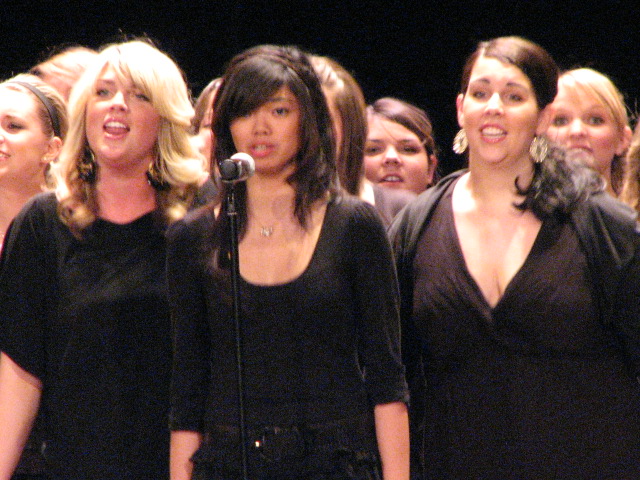
Next up was “Baby Mine,” which, in many ways, suffered from the opposite problems from the group’s opener. The good news is that the sound was still good, and probably even better, particularly with the good, clean choral blend that backed the solo at points. The bad news is that this was a real snoozer of a song choice, and I found the maternal theme a bit awkward for a collegiate group. Good enough middle song, but not a favorite of mine.
Secondary Dominance closed with Beyonce’s “Halo.” This was definitely the strongest offering from the group, with a good solo and well-planned, if a bit overdone, choreography. Very nice stomp and clap pattern to provide the beat late in the song, and I very much liked the decision for the group to fall out, and let the soloist close the song on her own.
As soon as the song was over the girls sort of shuffled off stage, a few of them waving awkwardly, some heading left, some heading right. The stage exit is a good opportunity to make a positive final impression on the crowd, and I feel that opportunity was completely squandered in this instance. I realize that many of my criticisms of this group aren’t exactly musical, and that some readers will question if they really have a place in an a cappella critique. The thing is, in an ICCA semifinal, a group has 12 minutes to make the case that it is professional, likeable, talented, and generally worthy of advancing to the international finals in New York City. The music will always be first and foremost in the advancement equation, but you can’t ignore the other elements of performance. Great groups don’t only nail the music—they nail the elements of showmanship that come with it.
The GMen rounded out the first half of the show. One of the neat elements of this show occurring at The Michigan Theater was that there was the potential for lighting effects, and, indeed, each set opened with the stage lights down. This was the first point of the evening in which that really came into play, as the running, jumping, chest-bumping figures appeared only in shadows and silhouettes. It was kind of funny to see. Regardless of the visual effects, it was nice to see the group take the stage with such energy and gusto, and I looked forward to seeing what the all-male squad would bring to the stage.
Clad in blue soccer jerseys and jeans, The GMen opened with “Crazy Little Thing Called Love” by Queen. The choreography was a bit over the top, but given the sort of personality the guys were clearly working to establish, I think it worked here. The music was mostly decent, but I couldn’t help finding the solo really strange. Again, we had a very classical sounding voice on a tune that didn’t altogether match that vibe. All in all, the song was good, and high energy, though I couldn’t help wondering how the group was going to follow that off the wall number.
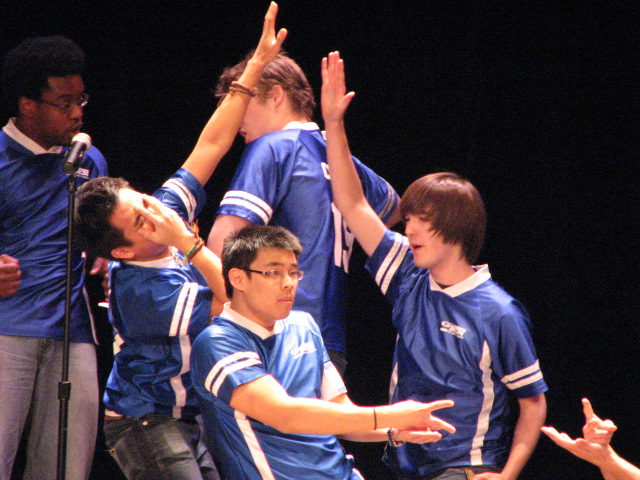
The guys sang “Careful” by Guster next. This was a really odd choice for a middle song to me. My general feeling is that ‘tweener songs—ones that are neither truly upbeat nor slow—don’t really have a place in an ICCA set, and this one was no exception. The solo was good, the percussion very good, but the song just wasn’t really grabbing. If you’re going to follow the traditional set mold of upbeat-ballad-upbeat, that ballad should both provide a change of pace and prove emotionally provocative. While I’ll concede that this was not nearly as high octane as the first or third songs in the GMen set, from an emotional perspective, it was just sort of there. Not a bad performance, but poor song selection here.
The guys wrapped up their set with “Thank U” by Boyz II Men. This was a lot of fun, providing a showcase to the group’s fine vocal percussionists, and letting the movement bust loose, complete with a break dance routine toward the end. While the crowd seemed oddly reluctant to join at first, by the end, the guys also succeeded in engaging the hometown crowd in a clap-along. This is the sort of entertaining song that is perfect for breaking things down at a regular campus show, when all you’re trying to do is entertain your fans. When you bring a song like this to competition, though, you have to be very careful about what you’re putting out there. I saw Syracuse University Groovestand use this very song to good effect in closing their 2007 competition set, and a part of why it worked was that they had soloists who were equipped to belt the vocals in a really memorable way, in addition to out of this world perc. Without that extra something, this song fell a little flat for me. OK ending to a really entertaining, but somewhat underwhelming set.
After intermission, it was time for A Cub Bella. The all-female group came out in bright pink tops, black ties and black bottoms for a good look, almost reminiscent of Brigham Young Noteworthy.
The women opened with Jordin Sparks’s “Battlefield.” They had good energy, and covered the stage well. My only real beef with this song was that it seemed to go on a bit too long, and grew redundant by the final minute. When a group picks a song like this for competition, it needs to be mindful of how it’s going to keep the audience engaged, which may mean cutting part of the song or sampling a different tune at some juncture. The group didn’t seem to switch up much here, the end result of which was a song that did not finish as strongly as it began.
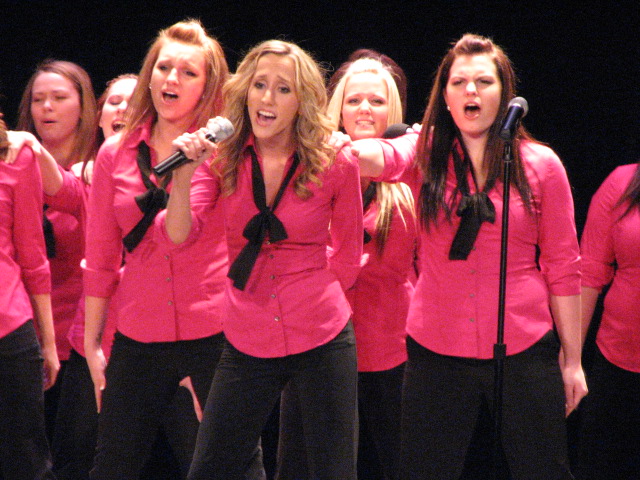
Next up was traditional Irish drinking song, “The Parting Glass”—a few days late for St. Patrick’s Day, but you can’t blame them for trying. This song—particularly Shaun Davey’s version that appears in Waking Ned Devine is one of my all-time favorites. As a fun bit of trivia, there’s a pub in Saratoga Springs, NY named after the song that’s worth visiting if you’re in the area. OK, I digress again. The women performed this one chorally, which was a nice change of pace for the evening. Very pretty harmonizing here, and while there wasn’t anything to really blow the audience away, it was pretty and well-executed. I would have liked to have seen less movement—for a song like this, I maintain that the way to go is something like what University of Oregon Divisi did with “Hide and Seek” years back, implementing just a small handful of slow, subtle repositionings, rather than worrying about having constant movement on stage.
A Cub Bella ended its set with “Radio” by Beyonce. This may have been the first heavily choreographed piece of the night during which I was legitimately content to sit back and enjoy the show. Sure, it was a little silly, but this song was all about hanging things out there, demonstrating the group’s energy and confidence, and providing a fun closer. The solo was good, the perc was pounding, and the group energy was solid for a good end to the set.
The sixth competing group was The Stereotypes. Before the all-male group got on stage, Smola explained to the crowd that the guys were working to fit four songs into their set, and needed for applause to be kept to a minimum, before proceeding to practice this with the audience twice. I’m guessing that this was intended as an earnest request, but the presentation helped the guys stand out—it became a bit of a running joke that the crowd would only applaud for a second between songs, which had an interesting effect of making the set, on the whole, that much more memorable. The guys took the stage to much cheering, wearing all black with brightly colored ties, for a neat look.
The guys opened with “Seize the Day” from Newsies. I have often chastised groups for sounding or looking like they’re performing musical theatre. This is one of those cases when a group takes that full-tilt—actually performing something from a musical, and it works. The guys had a very good choral sound, with plenty of opportunities for individual members to shine throughout, and plenty of fun visuals. Good stuff.
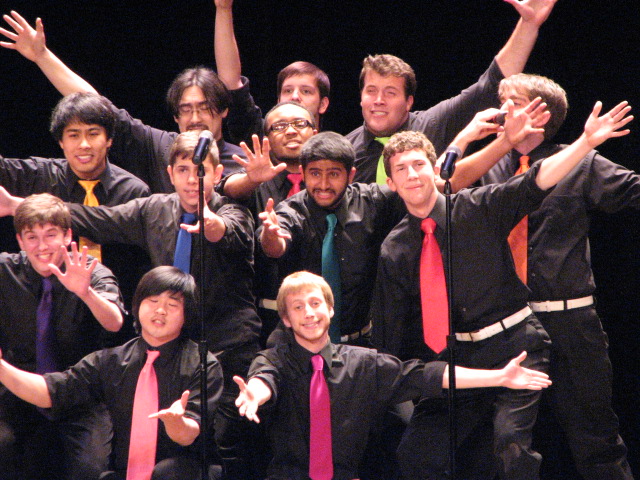
The Stereotypes followed with “Carry On” by Crosby, Stills, Nash and Young. This one seemed a bit musical theatre-ish to me, which wasn’t quite as a good of a thing, but I still found the guys really likeable in an unpretentious way. They had a great deal of energy and it was clear they were having fun with the material. All in all, it was a good number, but for how concerned the guys were about time, they probably could have cut it without really hurting the set.
It was in their third song that the guys from Washington U really began to shine, performing “Your Song,” originally by Elton John, more in the style of Ewan McGregor in Moulin Rouge. Simply fantastic solo here, but I think what I liked best about this number was the way that the guys let it build as it went on. At the end of the first verse, there was a marked tempo change, then, after the second, there vocal percussion came into play. This is how you develop a song organically, and keep the audience engaged. My only complaint here was that we twice got a visible cut off on stage, but I was willing to forgive it for the great sound and presentation that the guys otherwise put on.
One of the judges for this semifinal was Kristina Wood, whose bio noted that she had worked with A.R. Rahman on a music for a number of films, including Slumdog Millionaire. Oh the irony, that that’s exactly where The Stereotypes were headed with their closer, “Jai Ho.” Forgive my language, but this is probably the single ballsiest song choice I’ve ever seen an accomplished group make in a competition set. The solo was solid, and the choreography was, by far, the most fun of the night. The guys used a positively sick stomp and clap routine for percussion at one point. This is a textbook example of how you close a set—saving your most powerful, barn-burning number for the end; picking a song that very few a cappella groups in the world are doing; executing the heck out of it. I simply can’t say enough good things about this song, easily my favorite set closer I’ve seen so far in 2010.
Next up was Purple Haze. Beyond a history of making it to the ICCA finals, this co-ed group out of Northwestern University entered this year’s competition with the distinction of soloist John Park having been among the top 24 contestants on this season of American Idol. As a big Park supporter, was excited to see him back with the group for this semifinal. The group took the stage in a sea of black and purple. I would have liked the patterning a bit more uniform, but they looked sharp nonetheless.
Purple Haze opened with Chrisette Michele’s “Mr. Right.” Within moments, the group established itself as the one with the greatest capacity for sheer sound that night, with the female soloist leading the way. I really appreciated the confidence of the sound, the clarity of the perc, and the fact that the group did not feel compelled to launch into off the wall choreography, letting the music speak for itself. I did tire of the pounding volume after a bit, though, and worried that there were a number of spots when soloist’s power crossed the line to just screaming. It was a strong opener all told, though, and a good way for the group to establish itself from the get-go.
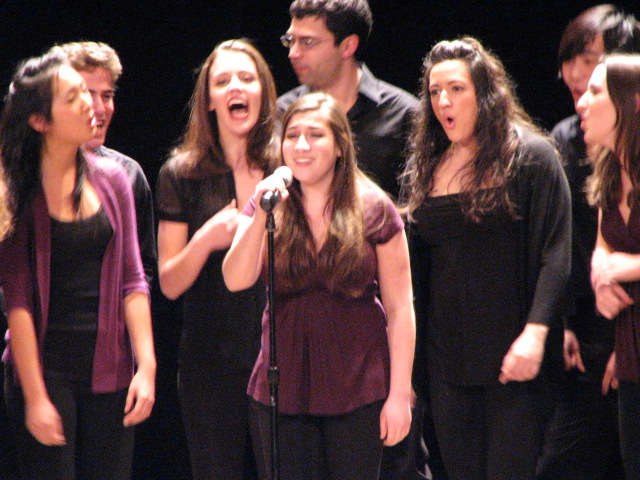
Next, John Park himself got on the mic to sing the solo for John Legend’s “Coming Home.” This is only the second time I, personally, have seen Purple Haze compete. The last time, in 2008, they had Regina Spektor’s “Samson” as their middle tune. The common thread is that Purple Haze knows how to bring down the house with a ballad. The solo was, without any question, the best I’ve heard in collegiate a cappella this year, and the group did a perfect job holding its own while allowing Park to shine. The song felt a little long, but in this case, that was a really positive thing—it was good enough that I just didn’t want it to end.
The group closed with “I’m Outta Love” by Anastacia. While I think this was generally better executed than “Mr. Right,” I worried that it wasn’t different enough from the group’s opener to really make sense in this set. For a truly great group—as I believe Purple Haze very arguably is—an ICCA set should provide you the opportunity to demonstrate your range, and the group just did not deliver in that way. Nonetheless, this was high energy and tight. My only real beef was the visual presentation on the part of the soloist, who kept turning around to dance with her back to the crowd when she wasn’t singing. This was cute, but sort of beneath an act the caliber of Purple Haze. Good, if mildly disappointing close to the set.
The last of the night’s competing groups was The Undertones. The mixed group came out in all black and matching royal blues. I wasn’t wild about the degree to which various members took creative liberties—for example, the guy in a fedora. Nonetheless, the group generally looked good.
The Undertones started with “Suspension” by Mae. Good, intense solo here, and a good range of dynamics. Strong visual presentation, with the group selling everything full-tilt. It was a fun opening to the set, but one of those instances when I couldn’t help feeling a group was hurt by placement in the show—a good performance appearing less impressive for having followed a group the caliber of Purple Haze.
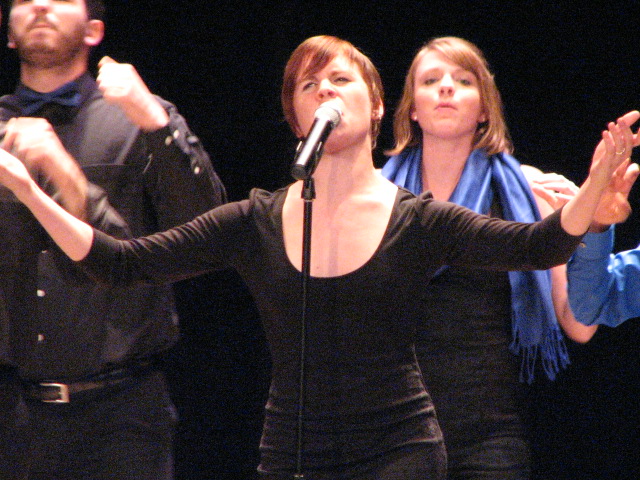
Next up was Death Cab for Cutie’s “I Will Follow You Into the Dark.” I love this song, and sort of love the idea of it being used as the middle song for an ICCA set. Pretty sound on this, and I liked the use of dueling male and female soloists. Very few people are really going to emulate the Death Cab vocals, so this was a good way of making the song their own. I particularly liked an instant when the group fell off, allowing the female soloist to do her thing on the high notes. There were some strange places in the arrangement, such as recurring bit in which the group went very staccato for no clear reason, which kept this from being as good as it probably should have been. Nonetheless, it was a solid middle song.
The Undertones finished off their set with Good Charlotte’s “I Don’t Wanna Be in Love (Dance Floor Anthem).” Good charisma from the soloist. There was a good backing solo from one of the women of the group, and a point late in the song in which the men and women alternated singing, to generally make better use of the co-ed format than most acts that night. Strong finish with some synchronized lines, after which the group members shot their heads downward to mark the end of the song.
And so we moved on to the deliberation period, during with Smola did an admirable job of filling the time. While I generally enjoy hearing more a cappella during this time, the use of an outside act worked well here, and Smola’s magic act was engaging enough to keep things entertaining, though a bit awkward as it became apparent he was stalling for time at points.
As we waited for the judges, I jotted down my picks for the night. In most substantive ways, I felt the competition was a two-horse race. Purple Haze offered up the strongest vocal percussion. “Jai Ho” had to land The Stereotypes outstanding choreography honors. For best soloist, I loved “Your Song,” but felt the only way John Park wouldn’t get the duke was if the judges held his Idol stint against him (not so much saying that he was bad on Idol, but more that it seems a little unfair for someone like that to walk in and compete for best soloist honors in a collegiate competition).
In terms of placement, I felt like the race for third was going to be tight between Amazin' Blue, The Undertones and The GMen—and, to a lesser extent, A Cub Bella. I ultimately gave the nod to Amazin' Blue for smart song choices, strong musicality, and generally making fewer mistakes than the others. As for first and second place, it seemed Purple Haze and The Stereotypes would be in a dead heat. At their best, Purple Haze was certainly the best group of the night. But what about the bigger picture? The Stereotypes presented four separate songs, and the latter half of the set, in particular, demonstrated innovation, courage, and some of the most entertaining moments of the evening.
The showdown between Purple Haze and The Stereotypes could also be understood as something like a David versus Goliath, or establishment versus counter-culture conflict. Purple Haze has been to the finals before, presented a polished act, and presented the traditional ICCA set to a tee. The Stereotypes offered up a four song set, covered musicals and performed a song mostly in Hindi. Ultimately, I liked that The Stereotypes showed greater range, I didn’t like that the first Purple Haze soloist got to screaming, and, at heart, I’m a fan of the underdog. I ultimately picked The Stereotypes to advance.
When ICCA Producer Andrea Kovac re-took the stage to announce the results, there were few surprises, though the judges often seemed to flip my first and second choices. I was glad to see The Undertones get a nod for outstanding arrangement. The Stereotypes garnered outstanding choreography and soloist honors, and the Purple Haze VP guy got his just rewards. The GMen landed as second runners-up.
As if to emphasize how close the final results were (the next day results revealed there was an almost unheard of two point difference between the top two finishers), Kovac made explicit mention that if the Midwest champs could not appear in the finals, the first runners up would take their spot. With that, we learned that The Stereotypes had finished second, and that Purple Haze was advancing once more.
Purple Haze performed an encore of The Jackson 5’s “I Want You Back,” with Park on the solo mic again. I was particularly impressed with his ability to hit the high notes, and can’t help thinking that if he had used this song on TV, he might have survived on Idol for at least one more week. Nonetheless, it was a pleasure to see him and the Purple Haze crew perform—while I wanted to see The Stereotypes progress to New York, I really can’t knock the Midwest champions, a fantastic group in its own right.
ACB Picks for the Night:
Overall Placment:
1. The Stereotypes
2. Purple Haze
3. Amazin' Blue
Best Soloist:
1. Purple Haze for “Coming Home”
2. The Stereotypes for “Your Song”
Best Vocal Percussion
1. Purple Haze
2. The GMen
Best Choreography:
1. The Stereotypes for “Jai Ho”
2. A Cub Bella for “Radio”
ICCA Official Results
Overall Placement:
1. Purple Haze
2. The Stereotypes
3. The GMen
Outstanding Soloist: The Stereotypes for “Your Song”
Outstanding Vocal Percussion: Purple Haze
Outstanding Choreography: The Stereotypes for “Jai Ho”
Outstanding Arrangement: The Undertones for “I Will Follow You Into the Dark”